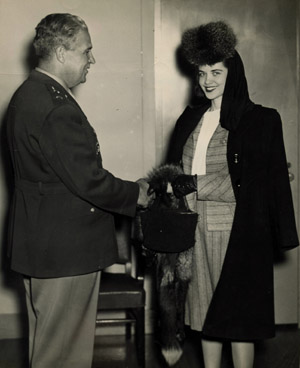Patricia Cox Owen joined the Manhattan Project in 1942, where she worked as a secretary for General Groves on the fifth floor of the New War building in Washington, D.C.
When Groves interviewed Patty in 1942, she was only eighteen years old. He empashized that she would have to work hard to measure up to his exacting standards. Groves was a tough taskmaster and had already gone through more than a dozen secretaries.
Patty’s desk was immediately outside Groves’ office and next to Mrs. Jean O’Leary, General Groves’ personal secretary. Mrs. O’Leary was a widow in her early thirties and mother of a young boy. Despite their age difference, the two women quickly became friends. Mrs. O’Leary was especially comforting when Patty lost both her beloved brother, a navigator in a bomber downed over the Mediterranean in June 1943, and her father at about the same time.
Patty reported to Col. William A. Consodine, who was deputy to John Lansdale, Groves’ chief security and counterintelligence officer. While her job description read, “Clerk-Steno,” the classification sheet completed by her supervisor in 1945 suggests the magnitude of her responsibilities by the end of the war: “Under general supervision of a Colonel but with wide latitude of independence of action and decision, incumbent performs numerous varied duties in a position which requires great responsibility and tact.” Not only did she take and transcribe top-secret memos for the Secretary of War, she was responsible for the confidential funds in the Washington office, “the amount of which cannot be stated for security reasons.”
Her other duties included “endeavoring before August 6, 1945, to keep out of the press and off the radio any reference to nuclear physics, atomic energy, atomic bomb, and sundry allied subjects; after August 6, 1945, to limit the use of information so as to protect the various secrets of the atomic bomb and the release of atomic energy and yet aid in the release of unclassified information…In many instances the incumbent diverts a dangerous query, persuades the author not to use it, and gives the author another idea as yet untouched by the press and radio.”
After the War, Patty worked for the National Insitute of Health as a Program Grants Manager.
Ms. Owen’s son, Don Owen of Bethesda, MD, recently provided the Atomic Heritage Foundation access to his mother’s collection of Manhattan Project memorabilia. The collection includes many gems, from photographs of Groves to World War II newspaper clippings.





